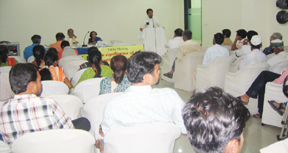
Archive 2009
|
May 1-15, 2008
Lok Raj Sangathan analyses significance of Constituent Assembly elections in Nepal The meeting was chaired by the Spokesperson of CGPI Prakash Rao, Vice President of LRS, Justice Ajit Singh Bains and LRS All India Council member, Sucharita. Welcoming the participants of the meeting, Sucharita announced that some members of the All India Council of LRS were in Nepal during the historic elections to the Constituent Assembly, as international observers. Dr. Venkatesh gave a brief historical perspective of the struggle of the people of Nepal, leading up to the recent Constituent Assembly elections and then described the experiences of the LRS delegation through a power point presentation. The presentation vividly showed the seriousness and enthusiasm with which the people of Nepal participated in the elections, overwhelmingly voting for an end to the monarchy and for a federal democratic republic. Justice Ajit Singh Bains, who had also been one of the international observers, described the well-organised and peaceful manner in which the elections to the Constituent Assembly in Nepal were carried out, despite the attempts of various foreign powers to sabotage them and prevent the Nepali people from exercising their franchise. Sharing his experiences of the peoples’ movement in Nepal and the role of the various political forces in that country, well known journalist Siddharth Varadarajan spoke of the challenges before the newly elected Constituent Assembly in Nepal, in countering the interference of various imperialist powers and in formulating the new law of the land, in tune with the aspirations of the various nationalities, communities and all the people of Nepal. He called on the Indian government to use its “good relations” with the US, to force the latter to withdraw the ‘terrorist’ tag on the Communist Party of Nepal (Maoist), which had won the people’s support and to stop interfering in the internal affairs of Nepal. Harish Chandola, writer and activist from Uttarakhand, spoke of how the people’s movement in Nepal has influenced the people of Uttarakhand, who share a common border with Nepal. He denounced the repression by the Indian state in the border areas, in the name of security. Dr. J.K.Jain congratulated the people of Nepal for having voted for a change of system and not just a change of government. Prakash Rao raised the important point that the lessons of the past century points to the need for political power in the hands of the people and not in the hands of political parties who rule in the name of the people. The role of political parties, he said, is to organize the people to make them capable of governing themselves. Various political forces within Nepal, as well as the Indian state and other foreign powers have been trying very hard to prevent political power from coming into the hands of the people. Such forces would be very happy to work out such power sharing arrangements and mechanisms that would lead to keeping the people out of power. The people of Nepal have to be wary of all such forces. Congratulating the people of Nepal for their historic step of electing a Constituent Assembly to frame a new constitution for their country, he pointed out that LRS has raised the demand for a new constitution for the Indian people. But all the political parties of the Indian ruling class, including the parliamentary communist parties, swear allegiance to the constitution that was made under British rule and do not want to address the real concerns of the people. The struggle in India today, he emphasized, is for political power in the hands of the people, for mechanisms by which people can exercise their power. The challenge before the people of Nepal, he said in conclusion, is to defend their gains from the internal and foreign enemies and to create the organization, the mechanisms, that will ensure power vests with the people. . Participants in the meeting raised many questions and issues related to the struggle of the people in Nepal and the lessons to be drawn from it. The discussion concluded on an optimistic note, with the participants enthused to take forward the struggle in India for an alternative to the existing party-dominated system of representative democracy, which will ensure political power in the hands of the people.
|
|||||||||||||||||||||||||||||||||||||||||||||||
 Lok Raj Sangathan organized a public meeting in New Delhi on April 19, 2008, to discuss the developments in Nepal and the elections to the Constituent Assembly there, successfully concluded on April 10.
Lok Raj Sangathan organized a public meeting in New Delhi on April 19, 2008, to discuss the developments in Nepal and the elections to the Constituent Assembly there, successfully concluded on April 10. 